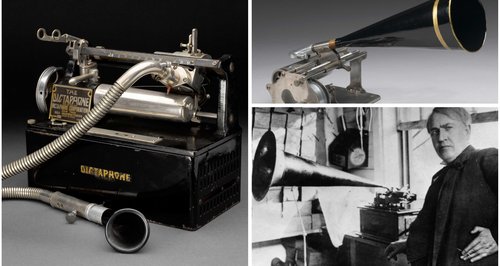On Air Now
Calm Classics with Ritula Shah 10pm - 1am
24 April 2020, 16:35

Before the music world had even heard of streaming and downloads, sound recordings were etched onto wax cylinders or even captured by the smoke from an oil lamp. Some of these recordings still exist today…
1890: Tchaikovsky speaks
In 1890 a group of musicians got together in Russia to marvel at some state-of-the-art technology: the Edison phonograph cylinder. Among them were composers Pyotr Ilyich Tchaikovsky and Anton Rubinstein, pianist and conductor Vasily Safonov and music-loving businessman Julius H Block.
And what does he do when faced with this early example of technology that would revolutionise the music world? He does what anyone would: talks rubbish and makes silly noise.
The recording is held at the Tchaikovsky House in Russia – and you can read about our visit to the composer's home here.
1860: the human voice recorded in smoke
An oil lamp helped capture the first recording of the human voice known to exist. Parisian inventor Edouard-Leon Scott de Martinville created a device called a phonautograph, which etched visual sound waves onto paper covered in soot and smoke from a burning oil lamp.
The inventor never intended to playback the recording, but one-and-a-half centuries later, the etchings have been deciphered and digitised.
1889: Brahms plays his Hungarian Dance No. 1
As audio treasures go, this is perhaps one of the most precious available to any music lover. In 1889, the great Johannes Brahms was recorded on a wax cylinder playing one of his Hungarian Dances. There's much debate as to whether the voice heard on the recording is that of Brahms himself, but it's definitely him thundering out his composition on the piano.
1888: 'The Lost Chord'
This is the earliest recording of music known to exist. In 1888 a recording of Arthur Sullivan's song 'The Lost Chord' was etched onto a phonograph cylinder. Sullivan was astounded at this new technology, but had his reservations too.
At the time he said: "I can only say that I am astonished and somewhat terrified at the result of this evening's experiments: astonished at the wonderful power you have developed, and terrified at the thought that so much hideous and bad music may be put on record forever."
1904: The Last Castrato
The practice of castration was outlawed in Italy in 1870, but luckily/unluckily Alessandro Moreschi made the cut (sorry) and has since become known as 'the last castrato'. He enjoyed a long career and in the 1900s he made a few recordings: however, Moreschi was a bit past his prime when this was captured on wax. But it's a fascinating insight into a now long-lost voice type.